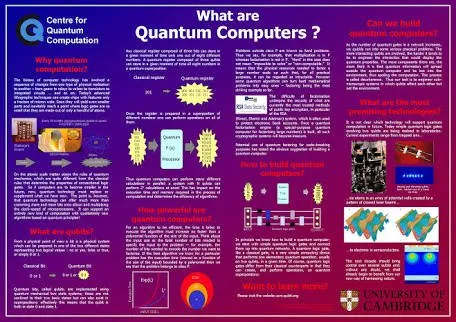
Classical Computers store information using bits represented by 0s or 1s But Quantum computers use quantum bits, or qubits, to encode information as 0s, 1s, or both at the same time. Basically It's means that Quantum system can be ina particular state which is contemporarily more than one state.
For example an electron which usually has spin “up" or “down" can be in a superposition of the two, hence being “up" and “down” at the same moment. (until the spin is measured).
This superposition of states—along with the other quantum mechanical phenomena of entanglement and tunneling—enables quantum computers to manipulate enormous combinations of states at once.
Regarding the use of quantum computers we are still at the beginning of this new era of computing, hence there are for sure a lot of way to use this new technology that have yet to be discovered.
Quantum computers are extremely good at completing very hard calculations faster that classical computers. For example the factorization of very big prime numbers, a task which is closely related to cryptography and security of passwords.
It has to be said that quantum computers can not be used in the same way in which we use normal computers such as playing video games.
Moreover they require (at least for now) a lot of space and very low temperatures in order to work.
Quantum computers enable algorithms to complete their analyses in fewer steps than classical computers do.
There are are a few areas that will be revolutionized by quantum computing applications.
Medicine:
Medicine and materials
Physicians administer doses of radiation to treat cancer, and often patients feel sick after treatment. Physicians can harness the power of quantum computers to more accurately determine the dosage and pinpoint where the radiation should be applied.
Chemists use computer-aided drug design to model compounds and their interactions. Quantum computers enable chemists to model extremely complex drug interactions, a task that would be impossible with classical computers.
Machine learning:
Computer scientists are training computers to sense and respond like humans. Using today’s classical computers to correctly identify an image of a cat requires the development of complex software and extensive, human-led training of the computer.
In Contrast that with how much easier it is to train a two-year-old child to recognize a cat.
Quantum computers show great promise in bridging the gap between human and machine thinking.
Searching big data:
Big Data is a new natural resource. More and more data is generated, stored and analyzed every day. Many data sets are becoming so large and complex that it is difficult to recognize patterns. Just think about how much weather data has been collected and how accurate today’s weather forecasts are. Forecasters need a different approach. The power of quantum computers can be used to find connections that today’s classical computers cannot.
CryptographyQuantum:
Cryptography is widely used to protect information residing on and in transit between classical computers. Keys are generated by multiplying two large prime numbers. Keeping the information secret relies on the difficulty of finding the prime numbers when only the multiplicative result in known. Quantum computers could threaten that type of encrypted information because they can identify those two prime numbers in a fraction of the time that classical computers require. Yet imagine if quantum computers could be used to strengthen post-quantum cryptography. That’s exactly what lattice-based cryptography will do.
We Have to wait more Time for Quantum computer becomes a reality in commercially used. Now it's only used By NASA and other Scientific Research organisation only .
More Information:
Source:
https://en.m.wikipedia.org/wiki/Quantum_computing
https://www.ibm.com/blogs/cloud-computing/2016/07/accomplish-quantum-computers/